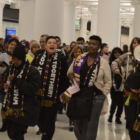
This article was jointly produced by Workday Magazine and In These Times. As the Israeli military relentlessly bombards 2.4 million Palestinians in the besieged Gaza Strip and a ground invasion appears imminent, one storied, national union — the United Electrical, Radio and Machine Workers of America (UE) — is opposing U.S. military aid for the state of Israel whose assault on the besieged strip has already taken the lives of at least 1,800 Palestinians (a number that is quickly rising) and displaced more than 420,000 others. The Israeli government’s overwhelming violence comes on the heels of a surprise attack by Hamas militants on October 7 when 150 were taken hostage and more than 1,300 people, almost entirely Israelis, were killed. “We certainly don’t support any killing, whether it’s in the form of bombs, guns, starving people through blockades, or through apartheid, from any side,” says Andrew Dinkelaker, the UE’s general secretary treasurer. “U.S. military aid going in is pouring gasoline onto a fire. It encourages that there be military solutions, and military solutions will get more people killed.”
In opposing U.S. military aid to Israel, the UE — along with some organizers, elected representatives and rank-and-file workers from other unions, as well as just a few progressive members of Congress like Rep. Rashida Tlaib (D.-Mich.) and Rep. Cori Bush (D.-Mo.) — is striking in a U.S. political climate defined by unqualified bipartisan support for Israel’s newly formed, hawkish “unity” government as it uses white phosphorus and cuts off fuel, food, water and electricity to Gaza’s entire population, which is about half children.
A video has been circulating of Israel’s Defense Minister Yoav Gallant saying, “We are fighting against human animals.” Israeli President Isaac Herzog said Friday, “It’s an entire nation out there that is responsible.











